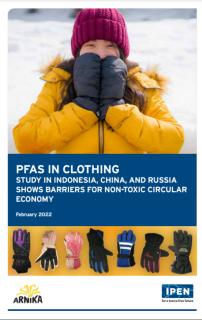
This study examined PFAS in 25 outdoor clothing and sportswear items. Eighty-four percent contained at least one of 55 targeted PFAS, most often fluorotelomer alcohols such as 8:2 FTOH. The results show that water repellence is typically achieved with side-chain fluorotelomer-based polymers, which can degrade into PFOA, a globally banned POP under the Stockholm Convention.
Findings reveal uneven global regulation: although PFOS and PFOA are listed under the Stockholm Convention, enforcement differs by country. The report calls for a class-based phase-out of all non-essential PFAS uses and stronger international cooperation through the Stockholm and Basel Conventions.
The study is aimed at Stockholm Convention focal points, national officials updating NIPs or managing hazardous chemicals and waste, NIP coordination bodies, regional centres, and other stakeholders working toward a non-toxic, sustainable circular economy.
